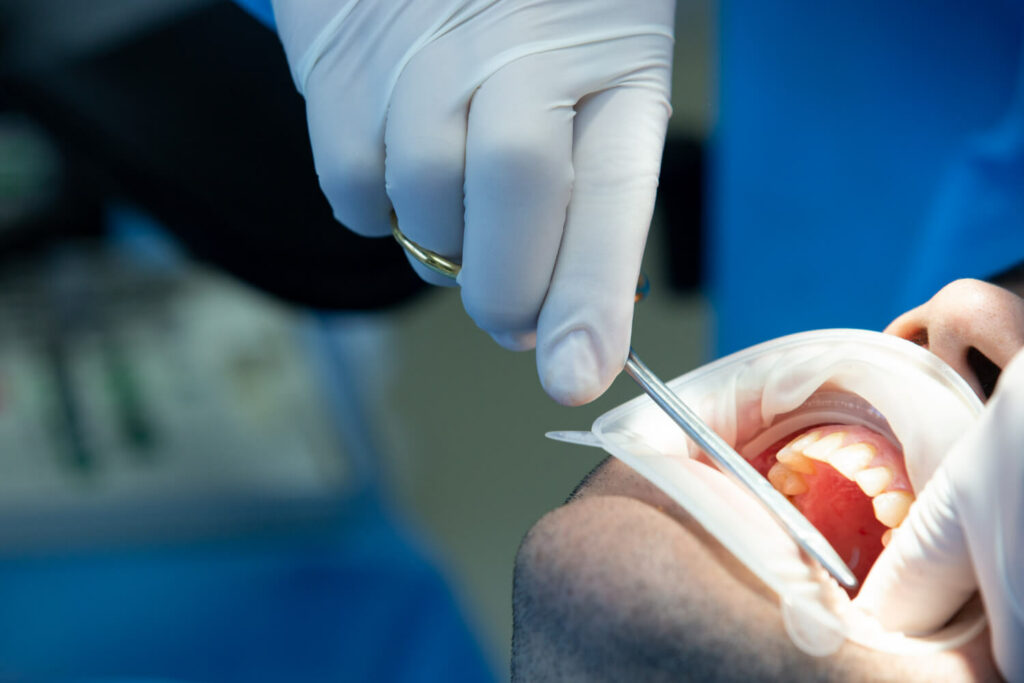The idea of sitting in a dentist’s chair for a long time can be frustrating. Especially when you don’t know how long does a root canal take.
But don’t worry as we’ll walk you through what happens during a root canal, how long the procedure usually takes, and why it’s an important step to keep your teeth healthy.
What is a Root Canal?
Before finding out how long a root canal takes, let’s first understand what it is.
A root canal is a dental procedure used to treat an infection or inflammation inside a tooth. This part of the tooth is called the pulp, and it contains nerves and blood vessels.
When the pulp gets infected due to deep decay, repeated dental procedures, or a crack in the tooth, a root canal becomes necessary to save the tooth and prevent further pain or infection.
Steps Involved in a Root Canal
To understand how long a root canal takes, it’s helpful to know the steps involved in the diagnosing and getting rid of a root canal:
- Diagnosis and Preparation: The dentist examines your tooth, takes X-rays, and explains the procedure. This initial step might take around 30 minutes. The dentist can diagnose many diseases like the cure gum disease, caries or edentulism.
- Numbing the Area: To ensure you’re comfortable, the dentist will numb the area around the affected tooth. This usually takes about 10-15 minutes.
- Removing the Pulp: The dentist makes an opening in the tooth and removes the infected or damaged pulp. Depending on the complexity, this can take between 30 to 60 minutes.
- Cleaning and Shaping the Root Canals: The dentist cleans, shapes, and disinfects the inside of the tooth. This part typically takes around 30-60 minutes.
- Filling the Canals: Once the canals are clean and shaped, they are filled with a biocompatible material called gutta-percha. This step takes about 20-30 minutes.
- Temporary Filling: A temporary filling is placed on top of the tooth to seal it until a permanent crown or filling can be placed. This final step usually takes 10-15 minutes.
Duration of a Root Canal Procedure
So, how long does a root canal take? On average, a root canal procedure can take about 90 minutes to 2 hours. However, this can vary depending on several factors:
- Location of the Tooth: Molars at the back of the mouth have more roots and canals than front teeth, making the procedure longer.
- Severity of the Infection: If the infection is severe or if there are complications, the procedure might take longer.
- Dentist’s Experience: An experienced endodontist (a dentist specializing in root canals) might complete the procedure faster than a general dentist.
Multiple Appointments
In some cases, a root canal might require more than one visit. If the infection is complicated or if additional treatments like placing a crown are needed, you might need to return to the dentist. Each visit could be shorter, around 30 minutes to an hour, depending on the required treatment.
What to Expect During a Root Canal Procedure
In our first section, we answered the question, “How long does a root canal take?” Now, let’s learn about what you can expect during the actual root canal procedure. Knowing what will happen step-by-step can help ease any anxiety and prepare you for a smoother experience.
Step-by-Step Breakdown
Diagnosis and Preparation
When you first arrive at the dentist’s office, the dentist will perform a thorough examination. This includes:
- Reviewing Your Dental History: The dentist will discuss your symptoms and dental history.
- Taking X-rays: X-rays help identify the extent of the infection and the shape of the root canals.
This initial step usually takes about 30 minutes and is crucial for planning the procedure.
Numbing the Area
Once the dentist confirms that a root canal is needed, the next step is to numb the area. Here’s what happens:
- Local Anesthesia: The dentist injects a local anesthetic to numb the tooth and surrounding gums. This ensures you feel no pain during the procedure.
- Waiting Period: It takes about 10-15 minutes for the anesthesia to take full effect.
This step ensures that you are comfortable and pain-free throughout the procedure.
Removing the Pulp
After the area is numb, the dentist will:
- Create an Opening: A small opening is made in the crown of the tooth.
- Remove the Pulp: Using special tools, the dentist removes the infected or damaged pulp.
This process can take 30 to 60 minutes, depending on the tooth’s complexity and the severity of the infection.
Cleaning and Shaping the Root Canals
Once the pulp is removed, the dentist will:
- Clean the Canals: The inside of the tooth is cleaned to remove any remaining debris or bacteria.
- Shape the Canals: The root canals are shaped to prepare them for filling.
This part of the procedure typically takes another 30 to 60 minutes. It’s crucial for ensuring that the tooth is thoroughly disinfected and ready for the next step.
Filling the Canals
With the root canals cleaned and shaped, the dentist will:
- Fill the Canals: The canals are filled with a rubber-like material called gutta-percha.
- Seal the Opening: A temporary filling is placed on top of the tooth to seal the opening.
This step usually takes about 20 to 30 minutes. The filling material helps prevent future infections and supports the tooth structure.
Temporary Filling
The final step in the root canal procedure is:
- Placing a Temporary Filling: A temporary filling is placed to protect the tooth until a permanent restoration (like a crown) can be done.
This step takes around 10 to 15 minutes. Your dentist will schedule a follow-up appointment to complete the restoration.

What to Expect After the Procedure
Now that we’ve covered how long a root canal takes and the steps involved, let’s discuss what happens afterward. It’s normal to feel some discomfort or mild pain once the anesthesia wears off. Here’s what you can expect:
- Pain Management: Over-the-counter pain relievers like ibuprofen can help manage any discomfort.
- Eating and Drinking: Avoid chewing on the treated tooth until it’s permanently restored to prevent damage.
- Follow-Up Appointment: You’ll need to return to the dentist to place a permanent crown or filling. This ensures the tooth is fully protected and functional.
Caring for Your Tooth After a Root Canal
In the previous sections, we discussed how long a root canal takes and what to expect during the procedure.
Now, let’s focus on an equally important aspect: how to care for your tooth after the root canal. Proper aftercare ensures a smooth recovery and helps maintain the health of your treated tooth.
Immediate Post-Procedure Care
Once your root canal procedure is complete, it’s essential to follow your dentist’s instructions carefully. Here’s what you need to do immediately after the procedure:
Managing Discomfort
It’s normal to experience some discomfort or mild pain once the anesthesia wears off. Here are some tips to manage it:
- Pain Relievers: Over-the-counter pain relievers like ibuprofen or acetaminophen can help manage pain. Follow the dosage instructions provided by your dentist.
- Cold Compress: Applying a cold compress to the outside of your cheek near the treated area can help reduce swelling and relieve pain.
Eating and Drinking
Your tooth and the surrounding area may be sensitive for a few days. Here’s how to handle eating and drinking:
- Avoid Chewing on the Treated Side: Try to chew on the opposite side of your mouth to prevent putting pressure on the treated tooth.
- Soft Foods: Eat soft foods like yogurt, mashed potatoes, and soup to avoid irritating the area.
- Avoid Hot and Cold Foods: Extreme temperatures can cause sensitivity, so it’s best to stick to lukewarm foods and drinks.
Long-Term Care
Taking care of your tooth after a root canal doesn’t end immediately after the procedure. Here’s what you need to do for the long-term health of your tooth:
Dental Hygiene
Maintaining good oral hygiene is crucial for preventing future dental problems. Follow these tips:
- Brushing: Brush your teeth twice a day with a fluoride toothpaste. Be gentle around the treated tooth.
- Flossing: Floss daily to remove food particles and plaque between your teeth.
- Mouthwash: Using an antibacterial mouthwash can help keep your mouth clean and reduce the risk of infection.
Follow-Up Appointments
Regular dental check-ups are essential to monitor the health of your treated tooth and overall oral health:
- Permanent Restoration: If a temporary filling was placed, you’ll need to return to your dentist to have a permanent crown or filling placed. This step is crucial for protecting the tooth and restoring its function.
- Routine Check-Ups: Visit your dentist every six months for a routine check-up and cleaning. This helps catch any potential issues early.
Addressing Common Concerns
You might have some concerns or questions about your recovery and the health of your tooth after a root canal. Here are some common concerns and their answers:
Sensitivity
- Why is my tooth still sensitive? It’s normal for your tooth to be sensitive for a few days after the procedure. If sensitivity persists for more than a week, contact your dentist.
- Is it normal to feel pain? Mild pain and discomfort are normal after a root canal. However, severe pain or swelling should be reported to your dentist immediately.
Potential Complications
- Infection: While rare, it’s possible for an infection to occur after a root canal. Signs of infection include severe pain, swelling, and fever. If you notice these symptoms, contact your dentist right away.
- Tooth Fracture: A root canal-treated tooth can become brittle and more prone to fractures. This is why placing a crown is important to protect and strengthen the tooth.
Frequently Asked Questions About Root Canals
In our previous sections, we covered how long a root canal takes, what to expect during the procedure, and how to care for your tooth afterward.
Now, let’s address some frequently asked questions about root canals to give you a complete understanding of this dental procedure.
How Long Does a Root Canal Take?
As we’ve discussed, the duration of a root canal procedure can vary depending on several factors. On average, a root canal takes about 90 minutes to 2 hours.
This includes time for diagnosis, numbing, removing the pulp, cleaning and shaping the root canals, and filling the canals. However, more complex cases or teeth with multiple roots may require additional time or multiple appointments.
Is a Root Canal Painful?
Many people worry about pain during a root canal. However, the procedure is typically no more painful than getting a regular filling, thanks to modern anesthesia techniques.
You may feel some pressure or mild discomfort, but the numbing medication ensures you don’t experience significant pain. After the procedure, you might feel some soreness or mild pain, which can be managed with over-the-counter pain relievers.
What Happens if I Don’t Get a Root Canal?
If you don’t get a root canal when it’s needed, the infection in the tooth can spread, leading to more severe pain and complications.
The infection can cause an abscess, which is a painful, pus-filled pocket that forms at the end of the tooth’s root. In severe cases, the infection can spread to other parts of your body, posing serious health risks.
How Long Does Recovery Take After a Root Canal?
Recovery after a root canal is usually quick. Most people can return to their normal activities the next day. It’s normal to experience some sensitivity or mild pain for a few days after the procedure, but this should gradually improve.
Following your dentist’s aftercare instructions and maintaining good oral hygiene will help ensure a smooth recovery.
Will I Need a Crown After a Root Canal?
In many cases, a tooth that has undergone a root canal will need a crown to protect it from further damage and restore its function.
The tooth becomes more brittle after the pulp is removed, and a crown helps strengthen and protect it. Your dentist will advise you if a crown is necessary for your specific situation.
Are Root Canals Expensive?
The cost of a root canal can vary based on the complexity of the procedure and the tooth being treated. Generally, root canals on front teeth are less expensive than those on molars, which have more roots and are more complex.
Dental insurance often covers part of the cost of a root canal, but it’s a good idea to check with your insurance provider for specific coverage details.




